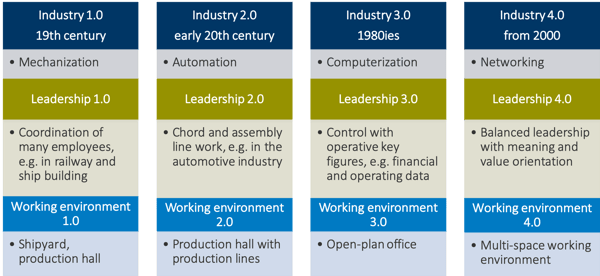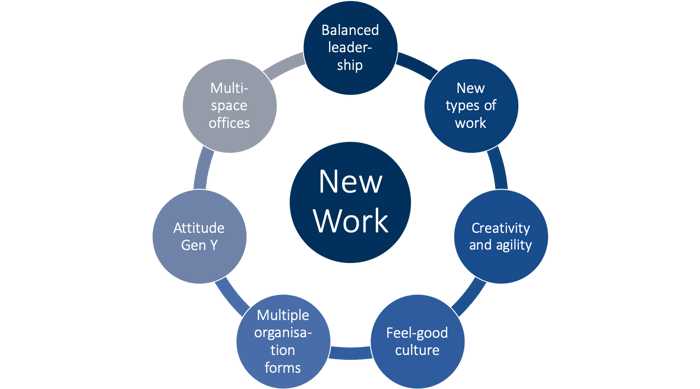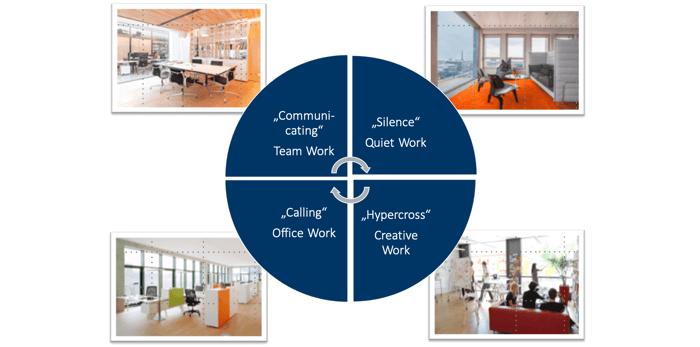New working environments (2) - room and new work
In our series "New Workplaces" we are dedicated to the topic "New Work" and the necessary transformation processes of the "Workplace Change". In addition to the quality in the environment, the corporate culture, the quality in the working environment, has a considerable influence on all areas of a healthy organization.

Figure 1: Quality in the environment in the overall context of a healthy organisation
In the second part of the series, we look at how a transformation process can be successfully implemented and which requirements the working environment, i.e. the space, must meet with regard to "New Work".
Nothing is more constant than change, and when you look at the evolution of the world of work in the last century, in terms of digitization, globalization and demographic change, you see that companies need to adapt to the New Work age as quickly as possible.

Figure 2: Development of the world of work in terms of industry, leadership and working environment
New Work or Work 4.0, what does that mean in terms of the working environment?
It is undisputed that a wide range of space options has a positive impact on employer attractiveness, collaboration and self-determination of people in the organisation. Especially a "Multi-Space" working environment contributes much more than other office concepts to the realisation of corporate goals. If the working environment is not right, cooperation and innovation are inhibited.
Figure 3: Requirements for the success of "New Work" (i. A. a. Schüller 2019)
Requirements for successful implementation of "New Work" (i. A. a. Schüller 2019)
1. New Work needs multiple organizational forms
In times of digital transformation "command and control" is antiquated. Multiple organisational forms, which allow the best operating system within an organisation to create added value, form the favoured future model. Because these are best suited to the constantly new, mostly unpredictable requirements of the future, the permanent beta. Employees follow jointly defined goals, work predominantly self-organized and are responsible for the results achieved.
2. New Work needs a feel-good culture
Even if we consider roles - such as that of "Feel good manager" - to be questionable, even more importance will be attached to a good climate in the future. Work should be fun, then performance usually goes hand in hand with it. If, on the other hand, a climate of fear or egocentricity prevails, this is always accompanied by a loss of performance. Fear is the biggest performance killer and people learn from mistakes, especially in an environment free of fear. Relationships at eye level instead of authoritarian action.
3. New Work needs creativity and agility
Agility is on everyone's lips, see our various publications (series "Agile Transformation"). If changes between different (leadership) roles have been frequent in the past, this will increase even more in the future. Through cooperation in cross-functional - and often agile - teams, the roles change more frequently. Anyone who is a "product owner" in the morning today is a "simple project member" at midday and a "lead" in the next role of a corresponding circle.
The work becomes increasingly project-oriented in order to be able to meet the changing challenges and the associated surprises. This was simply not necessary in the sluggish mass markets of the past. Agile methods and collaboration platforms support this.
4 New Work brings new forms of work
For many years there has been a trend to reduce the core workforce in order to be able to act more flexibly on the labour market. Employment agencies are experiencing a wonderful time as labour markets are tight. Conventional employment relationships are increasingly being dissolved through cooperation with freelancers, interim managers and temporary employment agencies. Many areas that do not serve direct value creation have already been outsourced. Organizations become more flexible and can react more quickly to changing conditions. Work therefore often takes place from anywhere in the world.
5 New Work needs balanced leadership
Even though many talk about flat hierarchies and organizations without leaders, there will always be leadership because it is necessary. It is only the question of how leadership is defined and what is meant by it. Even in supposedly flat organisational forms such as holocracy or cell and network structures, leadership is indispensable.
Nevertheless, the image of leadership will change more and more (see also our series on this subject). Leaders are always faced with new challenges: Generational change, technical innovations, virtual and digital leadership, employee potential development, health management as well as meaningful and value-oriented action. And all of this with an increased workload, ever thinner, fluid workforces and a market that never sleeps.
6. New Work needs multi-space offices
According to brain researcher Gerald Hüther, humans have two basic needs: Binding and growth. People want to know where they belong and they want to grow. Even in ancient times, the house had 5 basic functions: Protection, togetherness, cultural care, identity building and economic efficiency (Kulick, Quarch & Teunen 2017).
Organizations can make this possible by creating closeness. Those who sit close together or cross paths in the coffee corner create trusting relationships. Trust, on the other hand, is the binding force of organisations. Offices should therefore offer living spaces that serve the different needs of people and their tasks.
7. New Work needs a Gen Y attitude
As early as 1960, McGregor distinguished different images of humanity in his famous treatise: X and Y. The X attitude is more based on the assumption that people are lazy, less motivated to perform, and willing to learn. Attitude Y, on the other hand, is that people are committed, motivated and performance-oriented. McGregor already saw the key in self-determined work and flat hierarchies.
New work therefore requires a Y-posture, since trust, as a consequence of this posture, enables self-determined, responsible and flexible work. Put simply: when I think X, I have to control (permanently). Control of this kind requires a lot of time, prevents personal responsibility and potential development, and makes the organization slow.
Working Modes
In order to meet the requirements of "New Work", the following working modes and room concepts have been established:
- Rooms for quiet work, e.g. highly concentrated work, reflection, reading
- Rooms for teamwork, e.g. meetings, votes, planning
- Spaces for creative work, e.g. agile processes, brainstorming, project work
- Rooms for office work, e.g. telephoning, polls

Figure 4: Working modes in New Work
Personal Preferences
In addition to working modes, one must not forget the most important success factor: people. People are individuals and each is unique. The individual needs of employees must be taken into account in the working environment. Some employees are rather introverted and cannot exploit their full potential in "open-space" room concepts. Others, on the other hand, are encouraged to perform at their best only as part of a team.
Conclusion
The necessary transformation of the world of work is inevitable. The working environment, i.e. the space, plays a major role in "New Work" because "New Work" can only be lived if the spatial framework conditions are created for it.
In addition to the different working modes, the personality and individual preferences of the employees with regard to the working environment should also be considered. The premises must therefore offer an optimal environment that takes both aspects into account.
Employees should also have the flexibility to choose the working environment individually, according to their personal preferences, so that they can exploit their full potential.
Recommended reading:
New working environments (part 1) - room and quality
Literature:
Kulick A., Quarch, C. & Teunen, J. (2017). Officina Humana: The office as living space for potential development. Avedition
McGregor, D. (1960). The humanside of enterprise. McGraw-Hill
Schüller, A. (2019). What New Work means - explained in 7 points. Computer Week, 07.06.19

